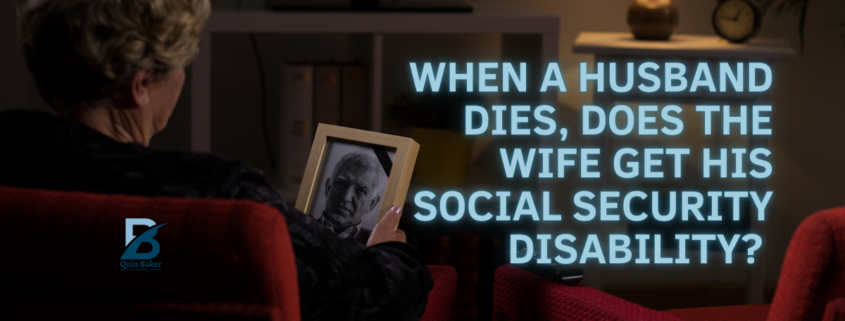When a Husband Dies, does the Wife get His Social Security Disability?
The unexpected loss of a spouse can be emotionally devastating and financially destabilizing. For many widows in Pensacola, Florida, navigating the complex world of Social Security benefits adds another layer of stress to an already challenging time. A surviving spouse may be eligible to receive their deceased spouse’s benefits, providing critical financial support. These benefits can help alleviate some of the financial burdens associated with the loss of a spouse.
Understanding Social Security Disability Insurance (SSDI)
Social Security Disability Insurance is a federal program designed to provide financial support to individuals who are unable to work due to a severe, long-term disability. Unlike Supplemental Security Income (SSI), which is needs-based, SSDI is an earned benefit based on an individual’s work history and the Social Security taxes they’ve paid over time.
To qualify for SSDI, an individual must:
- Have a medical condition that meets the Social Security Administration’s (SSA) definition of disability.
- Have worked long enough and recently enough under Social Security.
- Be under full retirement age.
It’s important to note that SSDI differs from retirement benefits, although both are administered by the SSA. While retirement benefits are based solely on age and work credits, SSDI requires proof of a qualifying disability that prevents substantial gainful activity.
Survivor Benefits: A General Overview
When a Social Security beneficiary passes away, their family members may be eligible for survivor benefits. These benefits serve as a financial lifeline, helping to replace a portion of the lost income. The SSA provides several types of survivor benefits, including:
- Widow’s or widower’s benefits
- Mother’s or father’s benefits (for surviving spouses caring for the deceased’s children)
- Children’s benefits
- Parent’s benefits (in some cases)
Eligibility for these benefits depends on various factors, including the survivor’s age, relationship to the deceased, and whether they have dependent children. The amount of the benefit is based on the earnings record of the person who died.
Widow’s Eligibility for Deceased Husband’s SSDI
Now, let’s address the central question: Can a wife in Pensacola, FL, receive her late husband’s Social Security Disability benefits? The short answer is yes, under certain conditions. Here’s what widows need to know about eligibility:
Age Requirements
- Full benefits are available to widows at full retirement age (currently 66 or 67, depending on birth year).
- Reduced benefits can be claimed as early as age 60.
- Disabled widows may claim benefits as early as age 50.
Marriage Duration
- Generally, the marriage must have lasted at least nine months.
- Exceptions exist for accidental deaths or deaths in the line of duty for military service members.
Impact of Widow’s Own Work History
- If the widow is eligible for retirement benefits on her own record, she can choose to take whichever benefit is higher.
- In some cases, she may be able to take one benefit first and switch to the other later to maximize her payments.
Special Considerations for Disabled Widows
- If the widow is disabled, she may be eligible for benefits as early as age 50.
- The disability must have started before or within seven years of the husband’s death.
It’s worth noting that these benefits, often referred to as “widow’s allowance” or “bereavement benefits,” are designed to provide financial support during a difficult transition period. The SSA views these payments as a continuation of the support that the deceased spouse would have provided had they lived.
Application Process for Survivor Benefits in Pensacola, FL
Applying for survivor benefits requires careful preparation and timely action. Here’s what widows in Pensacola need to know about the process:
Required Documents
- Proof of death (death certificate or funeral home documentation)
- Social Security numbers for the deceased, the widow, and any dependent children
- Birth certificates
- Marriage certificate
- Divorce papers (if applicable)
- W-2 forms or self-employment tax returns for the most recent year
- Bank information for direct deposit
It’s advisable to apply for survivor benefits as soon as possible after the death, as some benefits may not be retroactive. The SSA typically processes applications within 6-8 weeks, but this can vary based on the complexity of the case and the current workload of the office.
Factors Affecting Benefit Amount and Duration
Several factors influence how much a widow can receive in survivor benefits and for how long:
- Deceased husband’s work history and benefit amount: The higher the deceased’s lifetime earnings, the higher the potential survivor benefit.
- Widow’s age at the time of claim: Taking benefits before full retirement age results in a reduced monthly payment.
- Maximum family benefit: There’s a limit to the total amount of benefits payable to a family based on one person’s earnings record.
- Impact of remarriage: Generally, remarriage before age 60 (or 50 if disabled) ends eligibility for widow’s benefits, with some exceptions.
It’s important to understand that survivor benefits are not the same as inheriting the deceased’s full SSDI payment. The benefit amount is calculated based on a complex formula that takes into account the factors mentioned above.
Special Situations and Considerations
Navigating survivor benefits can be particularly complex in certain situations:
- Benefits for minor children: Children of the deceased who are under 18 (or up to 19 if still in high school) may be eligible for benefits.
- Lump-sum death payment: A one-time payment of $255 may be available to the surviving spouse if they were living with the deceased.
- Simultaneous eligibility for multiple benefits: In some cases, a widow may be eligible for both survivor benefits and her own retirement or disability benefits. The SSA will typically pay whichever amount is higher.
- Non-citizen spouse considerations: Non-citizen spouses may be eligible for benefits if they meet certain residency requirements or if international agreements apply.
Common Challenges and Appeals Process
Sometimes, claims for survivor benefits are denied. Common reasons include:
- Insufficient work credits for the deceased.
- Failure to meet relationship requirements.
- Missing or incomplete documentation.
If a claim is denied, the widow has the right to appeal. The appeals process in Florida involves several steps:
- Request for Reconsideration
- Hearing by an Administrative Law Judge
- Review by the Appeals Council
- Federal Court review
Each stage has specific deadlines, and it’s often beneficial to seek legal assistance, especially if the case reaches the hearing stage or beyond.
Don’t Let Grief Complicate Your Benefits: Contact Quin Baker, SSD Lawyer Today
Navigating Social Security survivor benefits can be complex, especially during a time of grief. Factors such as the deceased’s work history, the widow’s age and work record, and dependent children affect eligibility and benefit amounts. If you’re facing challenges with your Social Security survivor benefits case in Pensacola, the Quin Baker, SSD Lawyer is here to help. Contact us today for a free consultation and case assessment.





Leave a Reply
Want to join the discussion?Feel free to contribute!